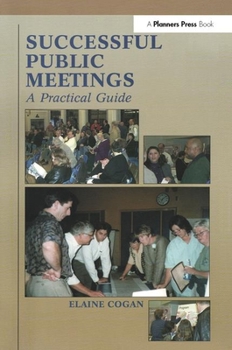Successful Public Meetings: A Practical Guide
The author explains why it's essential to begin the preparations by deciding what the meeting is intended to accomplish. That, in turn, determines what kind of meeting you should conduct: informational, advisory, or problem-solving. The author breaks down the essential tasks involved and even suggests the right type of person to handle each one. She describes various types of troublesome meeting attendees-from accusers and apathetics to fence-sitters and know-it-alls-and offers advice on how to deal tactfully but firmly with them all. The author also tackles working effectively with the media, a subject that terrifies most planners. True stories of public meetings, both good and bad, add humor to her no-nonsense narrative. Follow her step-by-step checklist and leave nothing to chance."





